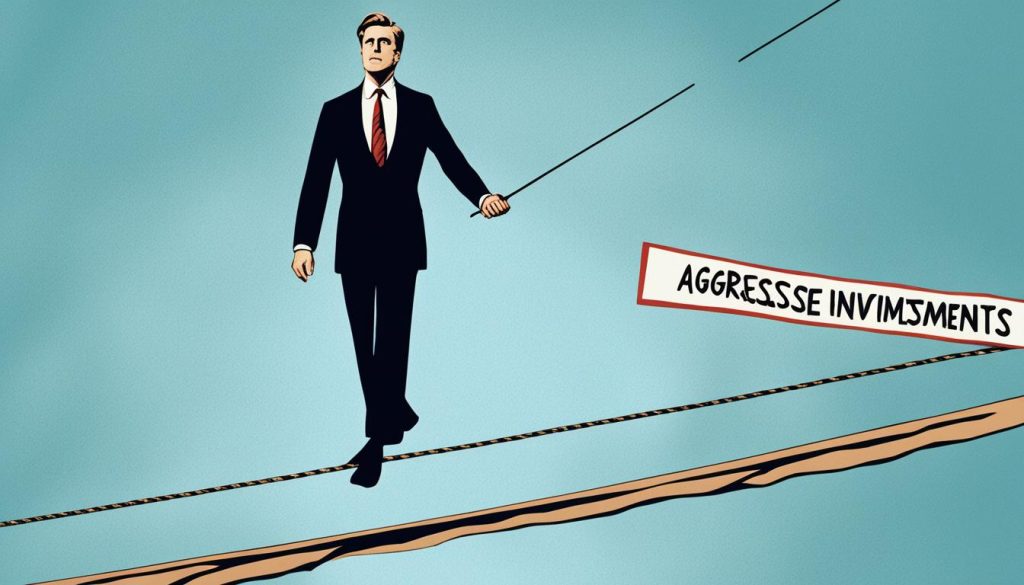To handle economic downturns, it’s smart to use several strategies to protect your money. A top priority is to set up an emergency fund. This means having cash in a safe, FDIC-insured account that earns good interest. It’s also key to spend less than you earn to avoid debt.
Getting a part-time job or doing freelance work can make you feel more secure in your job. Thinking about the long run and being clear on how much risk you can take with investments is also important. A healthy credit score is crucial for loan access when money is tight. Watching your spending and focusing on paying off debt should be part of your plan too.
Getting ready for tough times means building strong financial habits early. Keep an emergency stash of cash, take care of your credit score, and be smart about investing risks.
Key Takeaways
- Establish an emergency fund in an FDIC-insured, high-interest account.
- Live within your means to maintain financial stability.
- Diversify income through part-time work or freelancing.
- Focus on long-term investment with an understanding of your risk tolerance.
- Maintain a robust credit score for accessing loans during credit crunches.
Understanding Economic Downturns: What Does It Mean?
An economic downturn, often called a recession, means a big drop in market activity. This decrease can last months or years. It affects many things like GDP, income, jobs, production, and sales.
Usually, we say there’s a recession if GDP falls for two quarters in a row. Recessions lead to higher product prices and less profit for companies. Also, more people lose their jobs and things cost more, making it tough for many.
Times like the 2008 crash and the 2020 downturn from COVID-19 show why being ready is key. Good financial habits help us cope with these tough times.
When the economy slows, understanding the impact on GDP matters. It helps us expect and manage money issues better. Staying informed about finances helps us during downturns.
Building an Emergency Fund: Your Financial Safety Net
Having an emergency fund is key for financial safety in uncertain times. It should be easy to get to and kept in a reliable, interest-earning account. Such accounts are usually protected by the FDIC.
Start by Assessing Your Current Savings
To start, check how much you’ve saved so far. Knowing what you have can show if you’re ready for money troubles. Think about how much savings you have, how easy it is to use this money, and all the debts you owe.
How Much Should You Save?
Knowing how much to save is important. Experts say you should save enough to cover three to six months of living costs. This way, if you lose your income, you can still pay for things without getting into debt.
Best Practices for Maintaining Your Emergency Fund
Once your emergency fund is set up, keeping it up is crucial. Use careful budgeting to keep adding to your fund regularly. Cut down on extra spending and focus on keeping your savings strong. If you dip into your fund, refill it as soon as you can to stay secure.
- Check how your savings are doing regularly to stay on track.
- Live within your means and skip spending on things you don’t need.
- Always try to save a part of your income for emergencies.
Living Within Your Means: A Crucial Habit
Being wise with money is key, especially when times are good. It’s easier to develop good money habits then. Having a solid budgeting plan is crucial for keeping your finances healthy in the long run.
Creating a Realistic Budget
Building a budget starts with knowing what you earn and spend each month. It’s important to separate must-haves from nice-to-haves. This way, you can take care of essentials and still save some money.
Identifying and Cutting Non-Essential Spending
Small splurges can add up and dent your wallet. Listing all unnecessary spending helps you see where to cut back. Cutting down on things like movie subscriptions or meals out helps you stick to your budget.
Adjusting Lifestyles for Long-term Savings
Making small lifestyle changes can boost your savings. Living on one income, even if you have two, is a smart saving method. Choosing home-cooked meals over dining out is one example of how to save money without giving up life’s pleasures.
By following these tips, you can make your finances stronger and more stable. You’ll be ready for whatever financial challenges come your way.
Diversifying Income Streams: More Security, Less Risk
Diversifying your income is key to financial stability, especially during hard times. If one income source fails, others can support you. This strategy reduces financial risks.
Exploring Part-Time Gigs
Supplementing your main income with part-time work is smart. You could work in retail, deliver goods, or help small businesses. These jobs can protect you from money troubles.
Turning Hobbies into Income
Turning hobbies into money is a great idea. If you enjoy crafting, taking photos, writing, or cooking, you could make money from it. Sites like Etsy, Shutterstock, and blogs can help you get started.
Benefits of Freelancing or Consulting
Freelancing lets you pick your projects and might pay more than a regular job. Consulting can give you steady work and the chance to use your special skills. Both options can grow your income and help you professionally.
Investing for the Long Term: Strategies and Tips
Investing long-term is key to a strong financial plan. It helps you ride out market ups and downs. By knowing when to adjust your investments, you can grow your money and keep it safe over the years.
Understanding Market Cycles
Market cycles include times of growth and decline. Knowing these cycles helps you make smart investment choices. When the market grows, prices go up. When it shrinks, prices fall. This knowledge helps you decide when to buy or sell.
Why Patience Is Key
Being patient is vital for long-term investing. Markets naturally go up and down. Quick reactions to these changes can lead to losses. By sticking to your plan, you’re more likely to see your investments recover. Staying calm through tough times often pays off.
When to Adjust Your Portfolio
It’s important to tweak your portfolio now and then. As you get closer to retirement, choosing safer, easy-to-access assets is wise. After the market recovers, adjust your investments for safety and growth. Downturns can also offer chances to buy valuable assets cheaply.
To sum up, knowing about market cycles, being patient, and adjusting your portfolio are key. These actions create a strategy that holds up against market changes. This way, you manage your money well now and set up a secure financial future.
Being Realistic About Risk Tolerance
Knowing your risk tolerance is key to a strong investment plan. It’s about being clear on how much market ups and downs you can handle. Knowing this helps set clear limits.
Evaluate Your Risk Comfort Levels
To understand your risk levels, look closely at your goals and how you react to market changes. Do you stay calm or get worried when values drop? Knowing this helps balance your financial stability with how much risk you take.
How to Adjust Based on Age or Life Stage
Your investment approach should change as you go through life. If you’re younger, you might be okay with more risk because you have time to recover from losses. But as retirement gets closer, it’s wise to be more careful to protect your money and keep your financial stability.
Adapting to Changing Market Conditions
Smart investors change their plans based on market trends. It’s important to adjust carefully, aiming for long-term goals. Stay focused on your goals to avoid making quick decisions that could risk your investment comfort.
Diversifying Investments to Reduce Risks
Investment diversification is key for anyone looking to lessen risk. By spreading investments through different asset kinds, you lessen the impact of market changes on your funds. A varied portfolio boosts potential earnings and offers a safety net when the economy dips.
The Benefits of a Diverse Portfolio
A well-diversified portfolio has many upsides. It lowers the chance of big losses because different assets act differently under changing market scenes. Having a mix of assets like stocks, bonds, and real estate protects your portfolio against sudden market falls.
Uncorrelated Assets: Stocks vs Bonds
Adding uncorrelated assets to your investment mix increases diversity. Stocks and bonds, for example, often move in opposite directions. If share prices drop, bonds might go up, adding stability. This balance aids in lowering risk and makes your investment strategy stronger.
Innovative Diversification Strategies
For even better portfolio diversification, consider new strategies. You could invest across various sectors, different regions, and into emerging markets. Aligning these strategies with your investment goals and timelines makes your portfolio resilient to market shifts.
Using different asset subcategories and regularly updating your diversification approach strengthens your financial status. This gives you peace of mind regardless of market changes.
Maintaining a High Credit Score
Keeping a high credit score is key to getting loans when money is tight. Showing you’re good with money opens doors, especially when the economy is down. Here are steps to keep your score up.
Paying Bills on Time
Paying bills promptly is essential. It shows you’re responsible and boosts your score. Use automatic payments or set reminders to stay on track.
Managing Credit Utilisation
How you use your credit is crucial. Try to keep your card balances well below your limits. Aiming for a usage ratio under 30% will make you seem more trustworthy, helping your score grow.
Communicating with Creditors During Financial Stress
When money is tight, talk to your creditors. Tackling payment issues early and looking into hardship options helps avoid dents in your credit report. Keeping creditors informed might lead to solutions that protect your score.
How to Mitigate the Impact of Economic Downturns
To soften the blow of economic downturns, combine good financial habits with the ability to adapt. Start by building a strong financial base with plenty of emergency funds. These funds act as a safety net during hard times, keeping your finances stable when surprises hit.
Managing your debt well is key to lessening financial strain. Work on cutting down high-interest debts and keep a good credit score. Also, think about earning from different places, like side jobs or freelance work, to make your finances more secure and ready for tough times.
Getting ready for new economic challenges might mean learning new skills or changing your career path a bit. Keep learning and growing your professional network to stay employable, even when the economy changes. Making smart choices about spending and saving helps too, ensuring you cover your basic needs first.
Building these habits helps you stand strong during rough economic times. Surviving and even doing well in economic downturns needs both solid financial planning and the ability to adjust when things change.
The Role of Debt Management in Financial Security
Effective debt management is key to good financial health, more so in tough times. By paying off debts cleverly and using support available, one can keep their finances safe.
Prioritising Debt Repayment
Paying off debts smartly is vital. Making sure key debts like home loans and car finances are dealt with first helps avoid big troubles. Sorting debts by interest and amount can make repayment smoother and cut down overall debt faster.
Understanding Hardship Programmes
Knowing about hardship programmes can ease financial strain. These schemes help those in short-term financial trouble by offering things like lower payments. Using these programmes can bring quick relief and help with money matters in the long run.
How to Negotiate Lower Interest Rates
Talking down interest rates with creditors is a smart move in managing debt. It means lower monthly payments and less debt overall. Getting a better interest rate can also free up money for other needs and help your credit score.
Managing debt well, through smart repayment, using hardship programmes, and lowering interest rates, keeps finances stable no matter the economic weather.
Legal Considerations for Businesses During a Recession
When a recession hits, businesses face tough challenges. It’s vital to know the key legal points. This knowledge helps firms stay strong for the future.
Personal Guarantees and Their Implications
Personal guarantees can help get business loans. Yet, in tough economic times, they can heavily burden owners. It’s vital to understand their impact when planning for a recession.
Using good insolvency management can lessen negative effects. This makes the financial future more stable.
Dealing with Insolvent Trading
Trading when insolvent is risky. Businesses need to balance avoiding illegal trading with seeking ways to recover. Good financial planning and quick actions are key.
Getting legal advice is crucial to stay within the law. It helps in making strong recovery strategies.
Reviewing Contracts and Legal Obligations
It’s essential to review contracts during a recession. Companies must check if they can meet all legal duties. This may involve changing terms to lower risks.
Regularly updating contracts can help. This way, you can manage better in a tough economy. It helps businesses stay strong when facing economic challenges.
Emergency Fund Strategies for Businesses
In times of economic doubt, setting up a business emergency fund is crucial. This fund acts as a safety net, helping your business survive unexpected financial challenges. It’s important for keeping your business running smoothly and stable.
Importance of Liquidity for Stability
Liquidity is key for keeping a business stable. Having cash ready means you can cover crucial costs and keep going without a hitch. Good liquidity management is part of what makes a business strong and able to last.
How to Build and Maintain an Emergency Fund
Creating a solid emergency fund takes careful planning and steady work. Begin with tight budgeting, regularly saving some of your earnings. Cutting down on unnecessary spendings also helps grow your fund faster.
- Stringent budgeting
- Allocating a portion of profits
- Minimising unnecessary expenses
Utilising Financial Projections
Using financial forecasts is vital for your emergency fund. Predicting upcoming income and costs helps you know what to expect and plan your money accordingly. This way, your business stays ready for any money troubles ahead.
To wrap it up, these strategies lead to better financial safety. They protect your business from future money problems.
Career Strategies to Survive Economic Downturns
To get through tough economic times, you need more than careful spending. Being adaptable in your career is also key. By actively improving your skills, you can protect yourself from job losses and find new chances. Let’s look at ways to strengthen your career against future challenges.
Networking and Up-skilling
Networking is vital for staying strong in your career. Get involved in events related to your field, join online groups, and use LinkedIn to make new contacts. At the same time, learning new skills can make you more secure in your job. Earning extra qualifications or understanding new tech can make you flexible to changes in the job market.
Considering Side Gigs
Exploring side jobs is a smart move to add to your income. Look for freelance tasks, consulting jobs, or turn your hobbies into money-makers. Websites like Fiverr and Upwork can help you find projects that fit with your regular job. Starting these projects can give you extra money and might lead to bigger opportunities, making job searches easier.
Updating Resumes and Job-Hunting Tools
Keeping your CV and job search tools current is key for grabbing new chances during hard times. Update your CV regularly with new skills and achievements. Make sure you’re seen by potential employers by staying active on professional sites. Use job search websites like Indeed and Glassdoor to watch for opportunities. Keeping these tools sharp means you’re always prepared to advance in your career.
By focusing on building connections, learning new skills, looking into side jobs, and keeping your job search tools ready, you can better handle uncertain economic times.
Adapting Spending and Saving Habits During Economic Downturns
During tough economic times, it’s crucial to keep your finances healthy. This means spending wisely and saving more. You need to look closely at how you spend money and save to get through these times.
Evaluating Essential vs Non-Essential Spending
Knowing what you must spend on is key. It’s important to tell apart needs like housing, food, and bills from wants such as movies, eating out, or fancy goods. This helps you see where you can cut costs and keep important expenses covered.
Implementing Cost-Cutting Measures
Cutting costs can ease financial stress. This might mean less subscription services, eating out less, and choosing cheaper options. These steps help manage your money better when the economy is down.
Focus on Essential Living Expenses
When money is tight, it’s all about the essentials. Make sure you can always afford your home, food, utilities, and health needs. Keeping a sharp focus on these helps you budget and save wisely.
Planning for Future Financial Uncertainty
In an unpredictable world, it’s key to prepare your finances for whatever comes. A big part of this is having a good emergency fund. This fund helps when income is unstable, covering living costs for several months.
To make your money stronger, think about earning more and spreading your investments. You could start a side job or turn a hobby into something that makes money. Also, having investments in different things can lower your risks and make the most of the market.
Learning new skills is also important. It keeps you ready for new job opportunities. Managing your money well, like keeping on top of debts, is vital too. It helps you stay financially stable.
Getting ready for financial ups and downs means being active and flexible. By using these strategies, you or your business can stand firm. It’s about being prepared and having financial security, no matter what the future holds.















